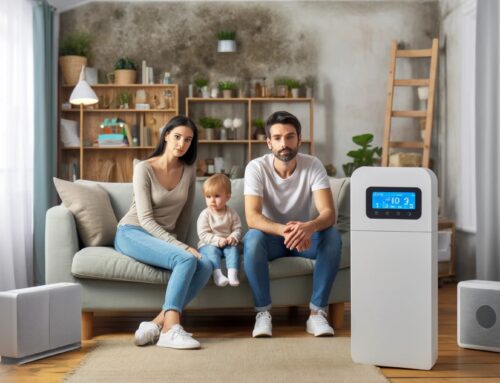August 8, 2025
Smart Home Air Quality Monitors: Complete Buying Guide
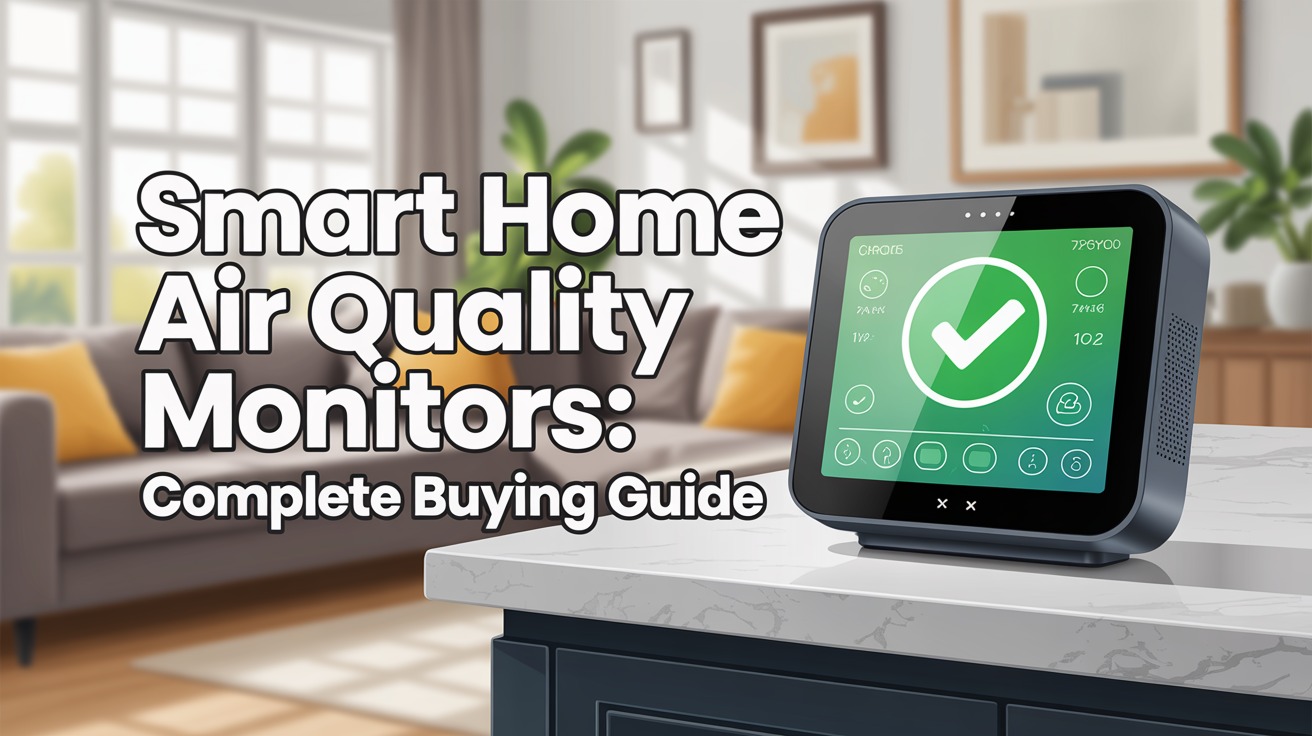
Smart Home Air Quality Monitoring Guide
Poor indoor air quality affects millions of Canadian homes, causing headaches, allergies, and long-term health problems. Smart monitors provide 24/7 protection, but knowing when professional testing is needed can save your family’s health.
Explore Professional Testing Services🔍 What Is Smart Home Air Quality Monitoring?
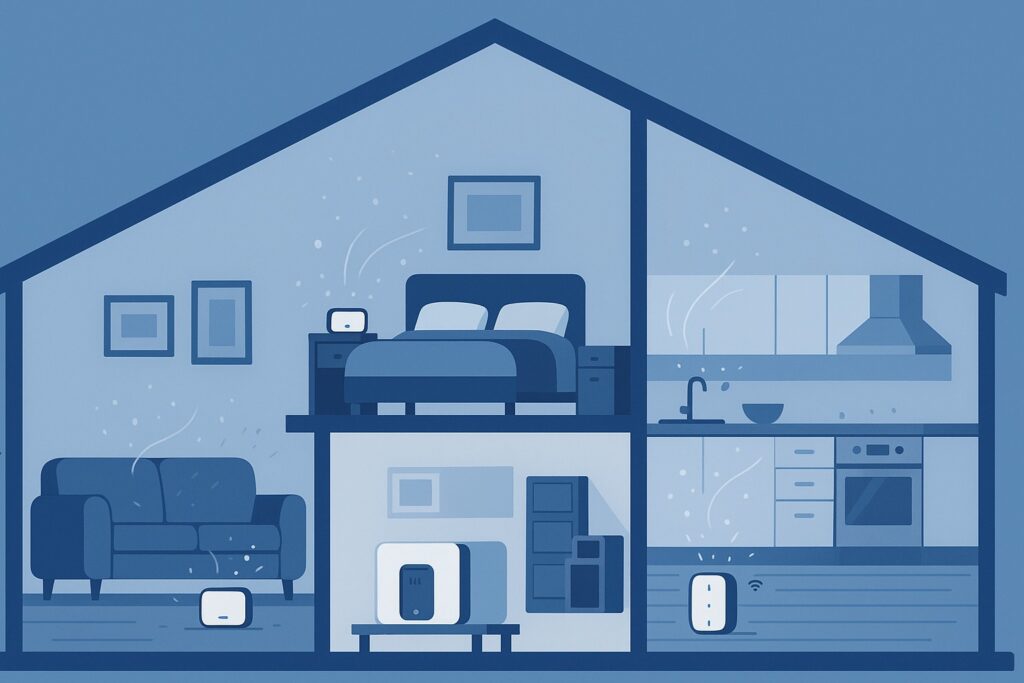
Smart air quality monitors are connected devices that track pollutants in your home 24/7. These devices measure dangerous particles and chemicals, then send alerts to your phone when air quality drops. Unlike basic air purifiers, smart monitors provide data-driven insights about your indoor environment.
Why Smart Monitoring Matters:
- Catches air quality problems before they affect your health
- Provides 24/7 protection your family needs
- Works automatically without daily maintenance
- Costs less than medical bills from poor air quality
📊 What Pollutants Do Smart Monitors Detect?
PM2.5 Particulate Matter
PM2.5 particles are 30 times smaller than human hair width. These microscopic particles come from cooking, traffic pollution, and mold spores. Safe levels stay below 12 µg/m³ according to WHO guidelines.
Volatile Organic Compounds (VOCs)
VOCs are chemical gases from cleaning products, furniture, paint, and building materials. Common VOCs include formaldehyde, benzene, and toluene.
Carbon Dioxide (CO2)
High CO2 levels indicate poor ventilation and stale air. Indoor levels should stay below 1,000 ppm for good air quality. Outdoor air contains about 400 ppm CO2.
Humidity and Temperature
Ideal indoor humidity ranges from 30-50%. High humidity above 60% promotes mold growth and dust mites. Low humidity below 30% causes dry skin and respiratory irritation.
💰 Best Smart Air Quality Monitors by Budget
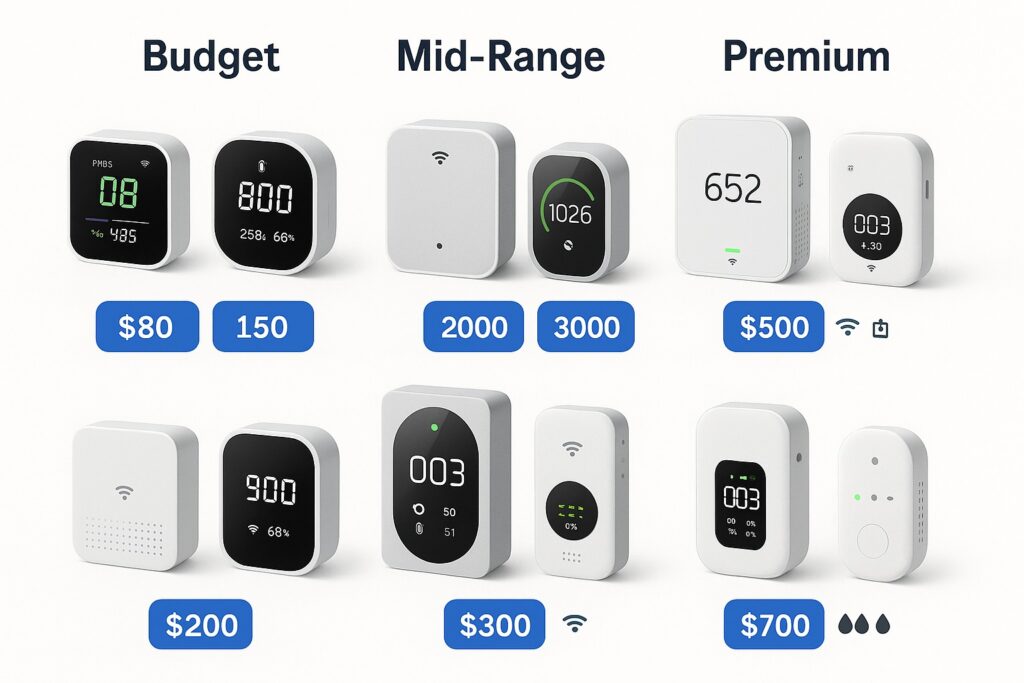
Budget Options
Amazon Smart Air Quality Monitor – $70
Tracks PM2.5, VOCs, CO, humidity, and temperature. Works with Alexa routines to control air purifiers automatically.
Temtop M10 – $90
Portable monitoring with rechargeable battery. No WiFi required, perfect for testing different rooms.
Mid-Range Options
Airthings Wave Plus – $139
Includes radon detection alongside standard pollutants. Radon causes lung cancer and affects many Canadian homes.
IQAir AirVisual Pro – $179
Professional-grade PM2.5 accuracy within ±10%. Includes outdoor air quality data and weather forecasting.
Premium Options
Airthings View Plus – $299
Most comprehensive detection: PM1, PM2.5, PM10, CO2, VOCs, radon, humidity, temperature, air pressure, and light levels.
Kaiterra Laser Egg+ Chemical – $249
Laboratory-grade VOC detection with specific chemical family identification.
🔗 Smart Home Platform Integration
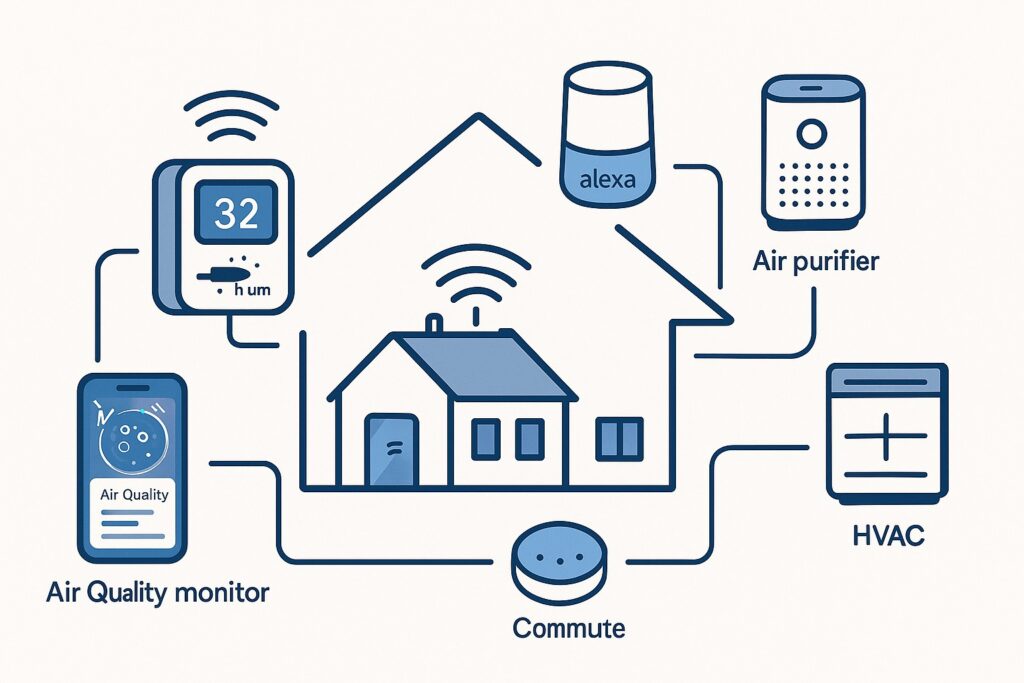
🎙️ Amazon Alexa Integration
Voice commands: “Alexa, what’s my air quality?” Automatic routines turn on air purifiers when pollution levels rise.
- Amazon Smart Air Quality Monitor
- Airthings devices
- IQAir models
🏠 Google Home Integration
Voice commands: “Hey Google, check my air quality.” Routines control smart thermostats, fans, and air purifiers based on air quality data.
- Nest Hub screen displays
- HVAC system automation
- Smartphone notifications
🍎 Apple HomeKit Integration
Most secure platform with Siri voice commands. “Hey Siri, what’s the air quality in the bedroom?” Privacy-focused approach keeps data on your devices.
🏃♂️ Portable vs Fixed Air Quality Monitors
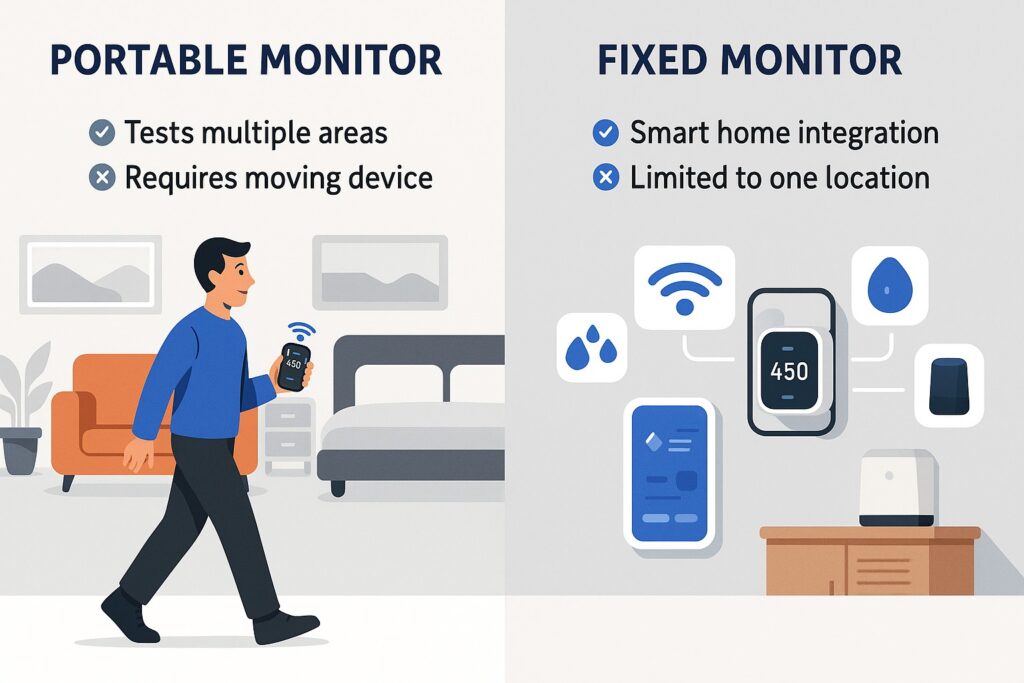
📱 Portable Monitors
- Battery-powered mobility
- Test different rooms easily
- Work during power outages
- No WiFi setup required
- Perfect for renters
Best For: Renters, room-by-room testing, identifying pollution sources
🔌 Fixed Monitors
- Continuous 24/7 monitoring
- More accurate readings
- Smart home integration
- Historical trend tracking
- Automatic alerts
Best For: Homeowners, smart home automation, long-term monitoring
🌟 Health Benefits of Smart Air Quality Monitoring
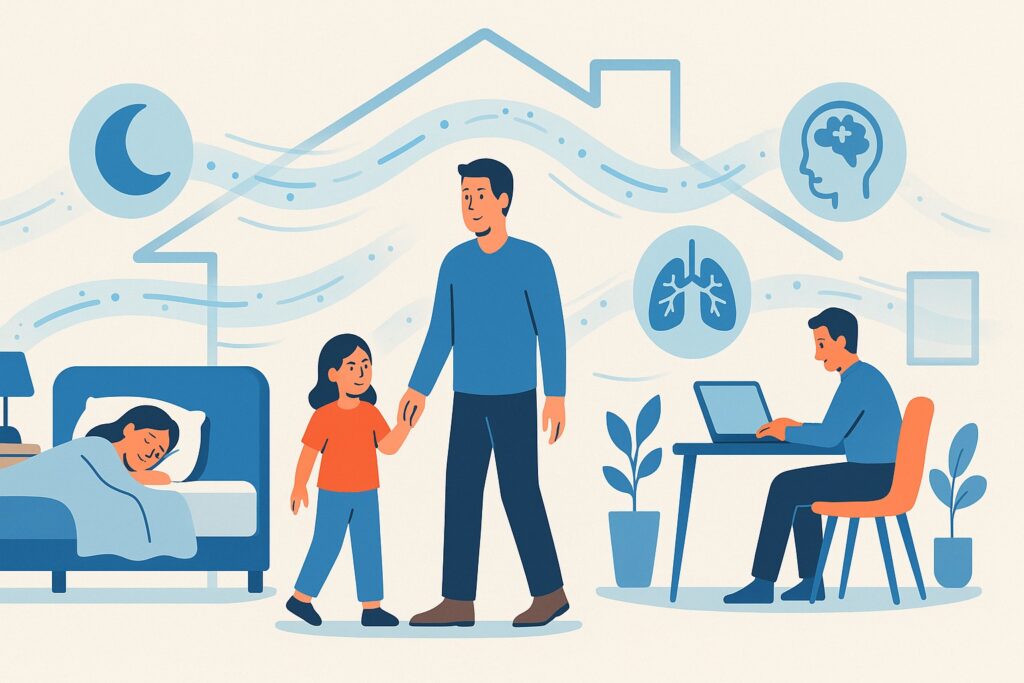
🫁 Respiratory Health Protection
Smart monitoring prevents asthma attacks by alerting you before pollutant levels become dangerous. Children’s developing lungs are especially vulnerable to air pollution.
😴 Sleep Quality Improvement
Bedroom air quality directly affects sleep quality and duration. High CO2 levels cause restless sleep, frequent waking, and morning grogginess.
- Optimal CO2 levels for deeper sleep
- Temperature and humidity control
- VOC detection from mattresses and furniture
🧠 Cognitive Performance Enhancement
CO2 levels above 1,000 ppm reduce cognitive performance by 15% according to Harvard research. Smart monitoring ensures home offices maintain optimal conditions.
❓ Frequently Asked Questions
Consumer smart monitors provide accuracy within ±20-30% for most pollutants, while professional equipment achieves ±5-10% accuracy. Smart monitors excel at tracking trends and relative changes rather than precise measurements.
Professional testing identifies specific mold species, asbestos types, and chemical concentrations that smart monitors cannot detect. Use smart monitors for daily tracking and professional testing for health concerns or real estate transactions.
Smart monitors detect mold spores as part of PM2.5 particulate matter measurements but cannot identify specific mold types or concentrations. High PM2.5 readings may indicate mold problems that require professional identification.
Visible mold growth, musty odors, or persistent high humidity readings warrant professional mold testing for accurate identification and remediation planning.
Multiple monitors help track air quality differences between rooms, floors, and indoor zones. Place monitors in bedrooms, main living areas, and basements for comprehensive coverage.
Use the same monitor brand and model for consistent readings between locations. Different brands may show varying results due to calibration and sensor differences.
Immediate actions include increasing ventilation, turning on air purifiers, and identifying potential pollution sources like cooking, cleaning products, or outdoor air infiltration.
Persistent poor air quality readings warrant professional investigation for hidden problems like HVAC contamination, building material off-gassing, or structural moisture issues.
Ready to Take Control of Your Indoor Air Quality?
Smart monitoring provides daily protection, but professional testing ensures complete peace of mind. Our certified experts use laboratory-grade equipment to identify specific threats that consumer devices cannot detect.
Contact Air Quality Testing Canada for comprehensive assessment that goes beyond smart monitor capabilities.
Schedule Professional Testing






